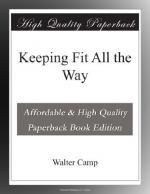In a group the leader constantly cautions the men as to carelessness or slackness. The individual having no leader must always keep his mind fixed upon the exact way in which his exercises should be performed. When he puts his hands behind his head in “Neck Firm” or “Head” he must keep his elbows back and his head up, while the chest should be arched. When he bends forward in the prone position he must not allow his head to droop. When he raises his knees in alternate motions he must bring his knees well up. When he does the exercise of leaning up against the wall, by means of the extended arm and hand, he must keep the distance far enough from the wall to bring about a certain amount of real effort by the hand, arm, and shoulder. And so it goes. It is for this reason that all the exercises are so carefully described and the method and manner of walking, marching, or “hiking” receive so much attention.
WORK AND HYGIENE
In a book recently published by one of the highest authorities on hygiene in the country, the following statements are made, statements which would prove of especial interest to those of us who have had the pleasure of being members of that “exclusive official Washington club,” or of the Senior Service:
The problem of the mental worker is to get sufficient physical exercise to keep the mind and body at its maximum efficiency. This problem gets more and more acute as he gets older. The amount of work necessary to keep the man of sedentary habits in good condition is about 100 to 150 foot-tons. Five hundred foot-tons is the amount of work a soldier would perform by marching twenty miles at three miles an hour on a level road.
It is a fallacy to think that sufficient exercise can be taken once a week. In order to be efficient exercise must be regular and at relatively short intervals. All exercise should tend toward using all of the muscles of the body. In fatigue a person has lost control over his muscles. The process of getting into condition, therefore, is directed more toward strengthening the nervous system in its control work over the muscles rather than in increasing sheer muscular strength.
Pure creative mental work, although requiring no out-put of physical energy, is perhaps the most productive of fatigue. The brain gets more blood during physical activity and waste products are much better removed. The effects of exercise are particularly apparent in the lungs. More fresh air is brought to the lungs and the waste products are driven off.
An attainable minimum for the average adult person might well consist of taking simple exercises in his room, and to get out of doors once a day and walk rapidly for at least half an hour. In addition, it is desirable for any one up to fifty years of age to take some kind of moderately violent exercise at least once a week. This




